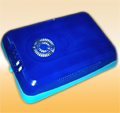

| Address: | PDS Enterprise Inc. 1650 West Artesia Blvd, Suite 278 Gardena, CA90248 |
| Phone: | 1-843-408-0142 |
| Email: | pdsenterprise@gmail.com sales@coolprototyping.com |


Home>Popular Page
7. Mbed Online Microcontroller Rapid Prototyping Tools
ARM and NXP introduced the mbed microcontroller rapid prototyping tools. ARM has developed mbed online platform for fast, lower risk prototyping of microcontroller-based systems. The mbed tools are easy to use and powerful enough to handle complex designs. The API-driven approach eliminates much of the lowe-level work normally associated with MCU code development. The mbed tools feature integral hardware and software support for the NXP LPC1768 ARM Cortex-M3 processor-based MCU, making cutting-edge microcontroller technology accessible to a wide audience.Engineers new to embedded applications can use mbed to experiment and test product ideas that could benefit from advanced microcontrollers. Experienced engineers can be more productive and adventurous in the proof-of-concept stages of development. Marketing, sales, application engineers, and distributors can use mbed as a consistent platform for demonstration, evaluation and support of microcontrollers, middleware and associated components. Education, enthusiasts, and inventors can use mbed as an accessible way to experiment with the application of microcontrollers without worrying about implementation details.
Development with mbed tools is focused on rapid prototyping by enabling the creation of proof-of-concept designs that exploit the functionality and cost saving opportunities presented by the inclusion of an advanced microcontroller in the system. The first mbed microcontroller hardware packages an NXP LPC1768 Cortex-M3 processor-based MCU and support components in a practical 40-pin 0.1" pitch DIP form-factor, ideal for experimenting on solderless breadboard, stripboard and through-hole PCBs. The mbed C/C++ Libraries build on top of the ARM Cortex Microcontroller Software Interface Standard (CMSIS) to provide high-level interfaces to microcontroller peripherals, enabling a clean, compact, API-driven approach to coding. The combination gives immediate connectivity to peripherals and modules for prototyping and iteration of microcontroller-based system designs, providing developers with the freedom to be more innovative and more productive.
Here are some samples we have done before, please kindly take a look:
Home - Popular Page - Popular Page7
 We are constantly looking for new products in order to grow our business and Invention Home has enabled us to streamline that process much more quickly.
We are constantly looking for new products in order to grow our business and Invention Home has enabled us to streamline that process much more quickly. Marsha Dunmyre
CA, U.S.A
BROWSE MORE
Cool Prototyping provides "one-stop" product design service: rapid prototyping, plastic molds, custom molds, production tooling and plastic molding.
Cool Prototyping Copyright 2008-2009 © All Rights Reserved. Rapid Prototyping
Cool Prototyping Copyright 2008-2009 © All Rights Reserved. Rapid Prototyping






